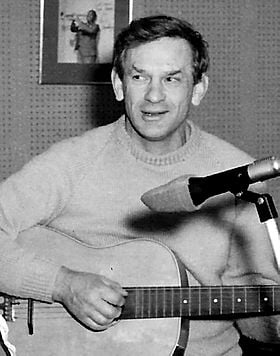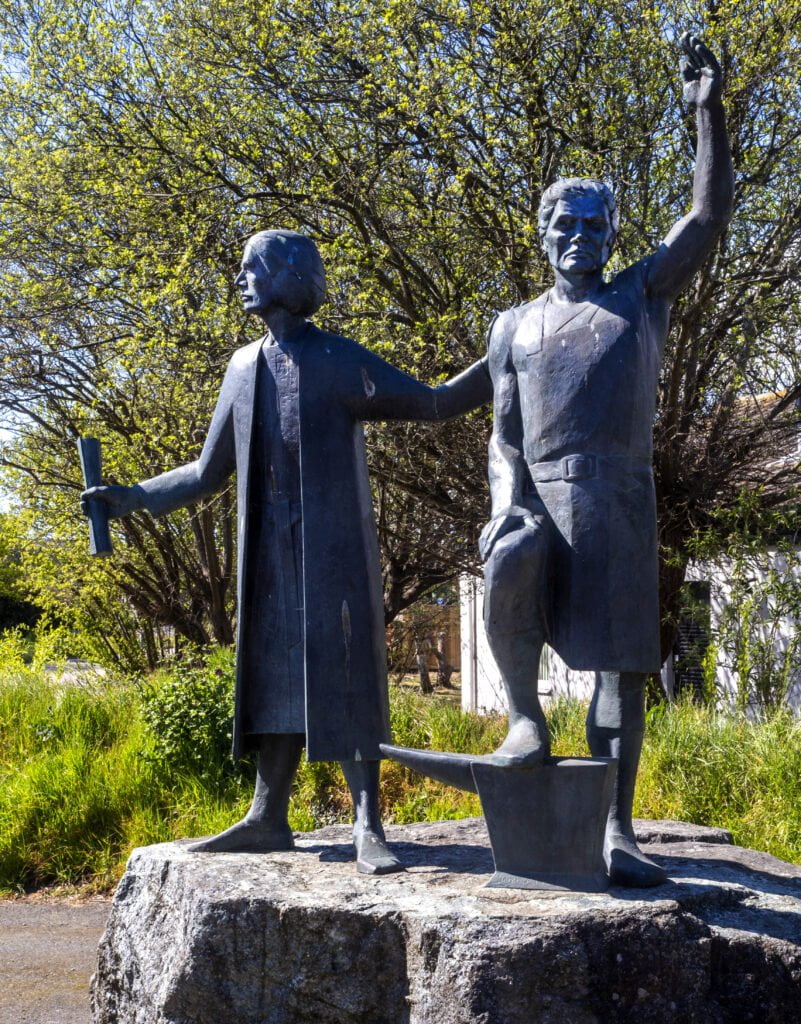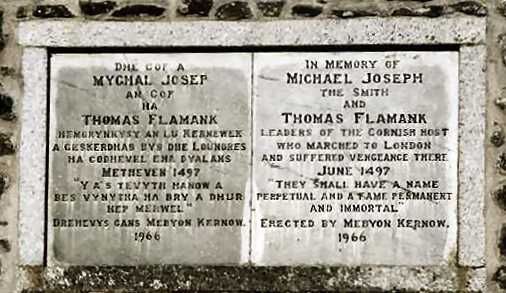This article was written for us in 1997 by the late great Richard Gendall.
He died in Liskeard in September 2017 at the age of 93.
He belonged to a Penzance family which moved to St Blazey when he was very young and later to St Winnow. A very highly respected Cornishman.

The summer of 1997 can hardly be allowed to pass without recalling that this is the 500th anniversary of the Great Cornish Rebellion of 1497; indeed, the fact has been widely publicised in the press and on television, and a commemorative march was organised to follow the route taken by the rebels to Blackheath. The historical facts behind this are as follows.
Henry Tudor, son of Edmund Tudor, Earl of Richmond, and of Margaret, daughter of John Beaufort, Duke of Somerset, was born in Pembroke Castle in 1456. Through his mother, he was descended from John of Gaunt, the fourth son of Edward III. He laid claim to the throne of England, and at the Battle of Bosworth in 1485 defeated Richard III. But the new king’s reign was marked by insurrections and wars. In Scotland, James IV was already recognising Perkin Warbeck as the legitimate Duke of York, giving him as wife his own kinswoman, Catherine Gordon. In October 1496 he invaded England, and after ravaging the north country, returned to Scotland. Henry VII started to raise money through special taxes to pay for troops and weaponry to deal with the Scottish problem, and this hit the poorer people of Cornwall badly: they refused to pay the tax on the grounds that the northern counties were bound by their tenures to defend the country themselves against the Scots. Rebellion broke out in Cornwall on about 14th May, 1497.
It would appear that a local tax officer, John Oby, Provost of Glasney College in Penryn, was accused of corruption, upping the tax demands, and pocketing the difference himself. The matter exploded into general insurrection. The leading rebel was a blacksmith from St. Keverne, one Michael Joseph customarily referred to today by Cornish patriots as An Gof (The Smith). The resentment against the tax caused many of the minor gentry to join forces with Michael Joseph, including John Trevysall, John Rosewarn, William Antron, Ralph Retallack, Richard Borlase, Thomas Polgrene, William Ham and John Allen. There was also support from some gentlemen of west Devon and throughout the southern counties of England. The rebels marched east, gathering support, and in Bodmin found a second leader in Thomas Flamank, a lawyer, the eldest son of a well-respected gentleman, Richard Flamank, who was in point of fact himself involved in assessing the King’s taxes. By the end of May they had reached Exeter where they demanded entry into the city but were kept waiting until eventually the commanders alone were granted admittance. Although the captains outside the walls threatened to behead the mayor for refusing the army entrance, they did not in fact commit any violence. Indeed, the good conduct of the rebels was commented upon. Flamank, it is said, talked “as if he could tell how to make a rebellion and never break the peace” and the army marched on towards Taunton “without any slaughter, violence or spoil of the countryside”.
One reason for the good behaviour was that the rebels blamed the king’s councillors, Sir Reginald Bray and Cardinal Morton, for the tax, Flamank having already argued that the Scots war was but a pretence “to poll and pill the people”. Sympathy for the cause was strong. When the army reached Taunton, there was a general uprising which extended north to Devizes, south to Dorchester, and east to Winchester. It was in Somerset, at Wells, that they gained a new supporter in Lord Audley who, being the only nobleman in the action, assumed the leadership. The Audleys had been implicated in the Buckingham rebellion in earlier years. and were never fully trusted. The first week of June 1497 marked the zenith of favour and support for the rebels, the number of whom has been estimated widely at between 15,000 and 40,000 (almost certainly an exaggeration). Messages were sent to the Mayor of Bristol to surrender the city, but he “made redy to withstand the said rebelles, and garnished the town walles with men harnessid with gonnes, and brought shippes and botes about the marsh garnished with men, artillery and gonnes…”
It was decided to abandon plans to capture Bristol, and the rebels marched on to Winchester and Guildford by way of Farnham. It had been hoped that the men of Kent would join the rebellion, but instead these joined their own leaders against it. At this disappointment some of the rebels lost heart and deserted. Meanwhile Audley took a northerly route, arriving at Wallingford on the 9th or 10th June. Henry had withdrawn from London in order to muster his troops at Woodstock, and thence advanced south, keeping to the north side of the Thames. He had then an army of 8,000 men ready for the Scottish war, under the command of Lord Daubeney. These men were ordered to prepare to meet with the rebel army, while the queen and the heir to the throne were placed for safety in the Tower of London. By June 13th, Daubeney had arrived at Houndslow Heath with the King’s army, and the following day the rebels reached Guildford where there was a slight skirmish with some of Daubeney’s spearmen at Gill Down. Daubeney did not manage to stop the rebels from finally reaching Blackheath, and it was said in later years that the King had been furious over his failure. It has even been questioned how eager Daubeney had been to prevent the rebels’ advance, since many of them were his Somerset neighbours, and possibly friends. However, he obeyed his orders, bringing his army to St. George’s Field, while the rebels moved first to Banstead Down and thence next day to Chussex Plain.
On Friday 16th June Daubeney moved his men from St. George’s Field to Croydon but returned to meet with the King and his army, making a total muster of some 25,000 against a possible 15,000 rebels. By now the Cornish and their allies had reached Blackheath where they made camp. Many now deserted, reducing the rebel army’s numbers to nine or ten thousand. Next morning the rebels’ few canon were drawn up at Deptford Strand, supported by archers, but these were charged down by the veteran fighters, not before some of these had been slain. In order to take the rebels by surprise, Henry had given out that he intended to attack on the Monday. He had divided his army into three companies which were to surround the Cornish and prevent their escape.
Meanwhile Audley had neglected to place any men on the high ground above the passage to protect the guns and archers at Deptford; nor had he brought forward the main body of his army. Daubeney charged on with his troop and would have been killed by the rebels who captured him, but “whether it were for fear or for hope of favour, they let him go at liberty without any hurt or detriment”. The rebels continued to fight with their bills, bows and arrows, and other rustic weapons, without horse or artillery, ill armed, and ill led by Audley. They made a brave stand but were overwhelmed. Michael Joseph attempted to escape to the Friars Church at Greenwich, to seek sanctuary, but he was captured before he could enter the church. Audley and Flamank were both taken on the field of battle. Few of the King’s army were killed, while the rebels lost some 200 of their men. The frequently noted prowess of the Cornish archers was commented upon after the battle, and this was at a time when English bowmanship was said to be supreme. When the Cornish arrows were gathered up they were noted to be of unusually great length “… so strong and mighty a bow the Cornishmen were said to draw”.
Tests on longbows recovered from the Mary Rose which was captained by another Cornishman in the reign of Henry VIII show a draw weight in excess of 1501bs.! After the battle, the king awarded knighthoods to his followers, ransomed some of the rebels, and imprisoned others. Michael Joseph was paraded through the streets wearing a jacket of green and white, the king’s colours; yet despite this he spoke “…as boldly to the people as he had been at his liberty”. All the goods taken from the rebels were given to the victors.
The three rebel leaders, Michael Joseph, Thomas Flamank and Lord Audley, were brought before the King and Council. Audley would be taken to Westminster with an axe carried before him. He would be sentenced and pass the night in Newgate. Next morning, he would be taken to Tower Hill, wearing a torn paper suit of armour, to be beheaded, a quick death reserved for the nobility. He was to be buried at Blackfriars Church. On the other hand, on Monday June 26th Joseph and Flamank had already been sentenced. Next day they were dragged from the Tower to Tyburn were they were hung, drawn and quartered. Before he died, Michael Joseph did not repent of his actions; indeed, he boasted that he would have “…a name perpetual and a fame permanent and immortal”. His prediction appears to have been true. although for nearly 500 years he was a forgotten figure of Cornish history. It was not until after the Second World War when Helena Charles gathered round herself a uoup of New Cornwall patriots that Michael Joseph and his story were made a centre piece of a new national consciousness, and, incidentally, the first efforts were made to popularise the black and white cross of St. Perran.
There are those who would like to see the rebellion as a Cornish national uprising, to avenge the defeat by the Saxons in 926, or an expression of solidarity with our fellow Celts, the Scots; but in fact it was a brave protest against unfair taxation, with more at stake than for the more recent protesters against the poll tax, for it involved the risk of losing one’s very life and in a most cruel manner; while in the 15th century no Cornishman would have heard of the term Celt, nor regarded the Scots as kindred. We would like to think of An Gof as a Cornish nationalist roused to defend his country, but in truth he was simply a courageous and remarkable man attempting to defend himself and his fellows against injustice. Cornwall certainly needs a national hero, and who better than one who was prepared to risk an unpleasant death for what he believed in? Michael Joseph was more courageous than any of us are likely to be who pretend to follow him; for he did not simply talk: he took action. This is his real example to us.

